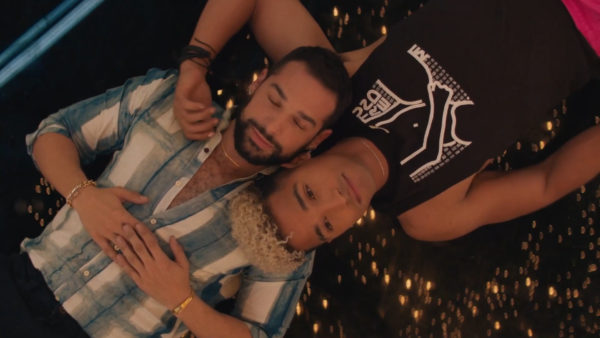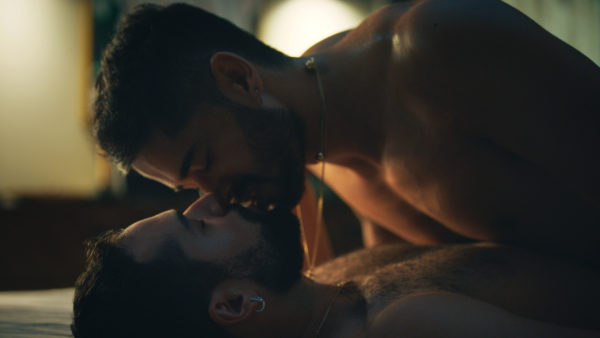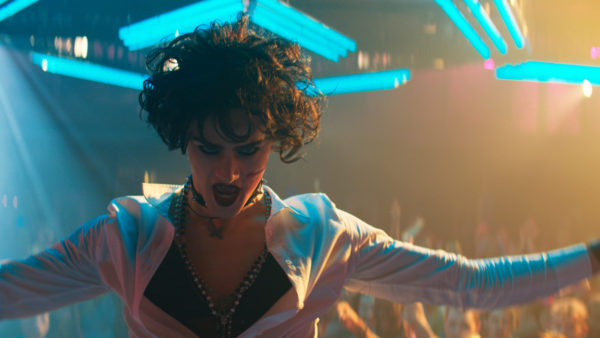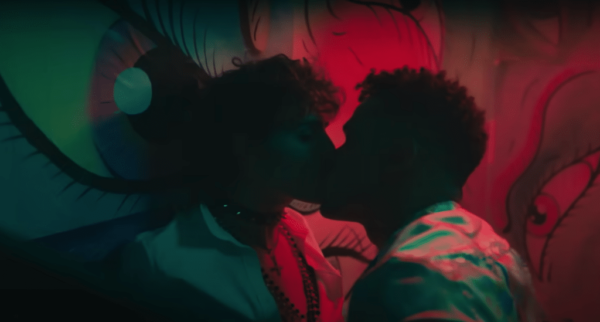
Each week Joe and Terry discuss the most recent episode of Peacock’s reboot of Queer as Folk, alternating between our respective sites.
Spoilers follow…
Episode 1: “Babylon”
JOE
Well this is interesting, Terry. 23 years after the debut of the defining UK series (developed by Doctor Who’s Russell T Davies) and 17 years after the end of the US remake that ran from 2000-2005, Queer as Folk is back.
Obviously the new series looks and feels quite a bit different from its predecessors. The 2022 version of Queer as Folk feels exceedingly contemporary (cue the haters using “woke” as a negative descriptor); I mean contemporary in terms of both its diverse cast of characters, as well as its updated language. And while the latter can occasionally veer into cloying (one character complains they’re being spoken to “in Twitter”), the former is exceedingly welcome.
It’s evident that executive producer Stephen Dunn (who also writes and directs this first episode) and his creative team have done a careful job of accurately representing not just the diverse queer population of New Orleans, but also the broader make-up of LGBTQIA people. The show features a mix of races, genders, abilities, and sexual orientations, which already makes it feel more reflective of the queer lived experience than its predominantly white, cis, gay male predecessors.
Like any pilot episode, “Babylon” has the challenging job of introducing a wide cast of characters and backstories while still delivering an entertaining hour of television. Dunn uses a tried and true approach to accomplish this: the re-introduction of an absent protagonist into a pre-established community of friends and family.
Here it’s Brodie (Devin Way), an early twenty-something med school drop-out, whose recent unexpected return to New Orleans requires him to reconnect with Queer as Folk’s main cast, as well as a brief cameo from Kim Cattrall and Ed Begley Jr. as his rich society parents, Brenda and Winston
When Brodie abruptly upended his life to go away to school, he left behind three principal people: an ex-boyfriend, Noah (Johnny Sibilly), a best friend Daddius (Chris Renfro) – who is now secretly fucking Noah – and Brodie’s trans friend Ruthie (Jesse James Keitel) who is expecting twins with her non-binary partner Shar (CG).
Brodie is both an updated take on the lothario Bryan character from QAF’s previous iterations, as well as a classic stereotype character, in that he’s a flake and afraid of commitment. This is quickly made evident by his introduction, which finds him escaping from an awkward racialized hook-up to commandeer a bicycle and a bottle of booze. He then spends the rest of the episode wandering from house to house, looking for a place to crash. Comments from Noah, Daddius, Ruthie and Shar all confirm that Brodie is lovable, but he’s also a messy bitch who creates drama wherever he goes.
Nearly three-quarters of “Babylon”s runtime is dedicated to introducing characters and establishing their relationships before two significant events occur: 1) Brodie has a meet-cute at with this version’s Justin, a 17 year old high school student/aspiring drag queen named Mingus (Fin Argus) and 2) an active shooter opens fire in the club.
Terry, the inclusion of this domestic terrorism storyline is going to be a huge topic of conversation in light of…well I was going to write “recent events,” but the reality is that gun violence is so pervasive in the US that it’s basically status quo. It’s clear that QAF is drawing upon the real life mass shooting at Orlando’s Pulse Nightclub back in 2016, which claimed 50 lives, and still stands as one of the most horrific hate crimes in LGBTQIA history.
Terry, how do you feel about the use of a shooting as an inciting incident for the series and what do you think the general reception will be? How do you think Dunn handles the events before (the more innocuous character introductions) and after (the hospital scenes)? And do you have a favourite character so far?

TERRY
It’s wild to me, Joe, that two huge properties (Stranger Things and now Queer as Folk) open their seasons with massive amounts of violence on innocent people. As you said, it’s easy to write “recent events” (I even did so on my Twitter feed), but when there’s been 213 mass shootings this year and, as of the day I’ve started writing this, we’re on day 143…well, there’s never going to an “appropriate” time to have a storyline centered around it that won’t be close to an event. And that’s depressing.
I’m glad, though, that the trailers for Queer as Folk centered around the shooting because it prepared me for going into it. Well, prepared might not be the right word because it still devastated me and the episode ended with me wiping tears away. But I knew what I was going into and so when Mingus’ drag performance stopped in its tracks with a look of horror on his face…I wasn’t caught off guard.
As queer men and queer critics, we talk a lot about queer pain and the way its used in media. In fact, we’ve talked about it recently and why creators have to walk a fine line when using violence to spur a queer storyline. We’ve seen it too much, whether it’s in hate crimes or bullying or violent words or mass shootings (I’ve personally complained about it being used as a narrative device).
So I’m conflicted about centering what I’m assuming will be a season-long storyline around this vile and violent event. I will say that creator Stephen Dunn and cinematographer Bruce Francis Cole do a phenomenal job of hinting at the violence and showing brief bits of the aftermath, but not lingering on the violence done to queer bodies. We don’t even see the killer, outside of his frame, because Dunn focuses the attention on the queer people and their resilience.
I found this sequence to be more emotional than it was horrifying, if that makes sense, simply because it was framed on our group of protagonists trying to make sense of what happened and find their loved ones. I also think that by beginning the series rather than ending the season with the shooting, it will allow the narrative to focus on resiliency and community. So, my annoyance with focusing on queer pain aside, it’s probably a smart choice in that regard.
What I unabashedly love, though, are the characters and the effortless way they’re introduced. Continuing with the themes of community mentioned above, the fact that most of, if not all of, these characters all know each other or are in each other’s social circles made keeping track of everyone very easy. I legitimately laughed when Brodie called Daddius to ask about Noah…while Daddius was fucking Noah…culminating in the visual gag of Daddius slipping out of the house as Brodie comes in.
Continuing with Brodie, the easy phone calls and conversations he has with everyone as he makes his return to New Orleans feels cemented in a place and a community. These people feel real and their friendships and lives feel lived in. Without even knowing their names, it felt like easing back in with friends. And that’s not an easy thing to get right.
“Babylon” sprung a whole bunch of characters on us and I’m not exactly sure who’s my favorite yet. Each one is given a standout moment this episode, but we still don’t know them too well. Right now, I’m actually most curious about some of the side characters who aren’t embedded in our little group. Marvin (Eric Graise), a wheelchair user, who singles Mingus out in the line to get into Babylon, for example. His “follow me, Chicky” comment, where he tells Mingus that if he’s 21, Marvin’s a Rockette was such a good introduction. It’s the way in which Bussey Horewood (Armand Fields) is introduced as a cold, dismissive drag queen who, in the hospital, ignores her gashed leg to point out members of her queer family to the doctors. It’s little moments like this that make me want to know more about their characters, even though they aren’t the main focus so far.
I’m not very familiar with either of the original series, unfortunately. I’ve seen a handful of episodes, but I didn’t have cable when they were on air, but I also like the way this reboot frames Brodie as the father of Ruthie and Shar’s babies, much like Brian was for Lindsay and Melanie in the original US series. Shar’s relationship with Brodie seems as equally frosty as Melanie’s was, from what I remember.
But I’m curious, Joe, since you seem to be familiar with the original series, what’s your connection to either the US or the UK series and how do you think the characters here stack up so far? Which character(s) are you most intrigued by so far? And can we gush over Mingus’s The Craft drag performance? You also mentioned Kim Cattrall and Ed Beley Jr., but we also have Juliette Lewis (after her stellar turn in Yellowjackets)! What do you think of the casting and Lewis’s “cool mom” vibe?

JOE
Oh I’m loving Lewis’ take on the overprotective mother role. Obviously fans of the US remake will compare her to Sharon Gless’ Debbie, but Lewis (in my mind, at least) is bringing a much younger, more hip perspective to the role. Parents of today’s queer youth are so involved in their kids’ lives, so it doesn’t feel intrusive – or even unbelievable – to see a mother discussing drag with her son. And Lewis always brings such a dynamic, charged presence to everything she’s in; it’s fascinating to see that kind of punk rock energy encased in Mama Bear trappings.
Regarding my history with the series, I’ll confess that a lot of my experience with QAF is more about how it’s baked into the cultural landscape. Both the UK and previous US series came out at a time when LGBTQIA rights were in flux and, as a foreign series and a cable series, both were able to get away with a lot more sexually progressive material than their American network counterparts, in terms of storylines and in actual sex acts (hello to bare asses!)
My relationship to the UK original is stronger, if only because of the timing that it aired. I was still in high school when it debuted on Showcase in Canada and it was one of two titles that my closeted gay ass used to question my sexuality before I dared make a move in real life (the other is, of course, David Cronenberg’s Crash).
I’d read about the sexual frankness of Davies’ series, which was lauded by critics and condemned by Conservatives, as well as some queers viewers who resented things like an older gay man courting a high school student, the suggestion that the queer community is composed exclusively of white gays and that we’re shallow, sex-obsessed and afraid to commit.
It’s fascinating, then, to see how this new iteration both confronts and adheres to the same critiques, albeit with two decades of inching the dial forward courtesy of more popular/accessible/conventional series like Will & Grace, Ellen and any number of CW series.
For me, Queer as Folk was an eye-opening escape into a world that I wasn’t ready to admit that I wanted to be a part of. I had massive crushes on both Aiden Gillen (still do) and Charlie Hunnam (less so) and the series’ unabashed refusal to censor gay sexuality was such an exciting turn-on. I can understand why audiences may have preferred the US remake, which went on for longer and delved more deeply into a variety of issues, but for me, there was something iconic about the short, contained structure of the British series that was very appealing. I could tell my mom that Series One was a critically lauded limited miniseries, send her to bed and then play out my fantasies by living vicariously through these men.
Looking back on the heavily filtered perspective that Davies was offering, however, I’m far more excited by the advances our community has made that will hopefully be captured in this new version. I’ve grown less interested in seeing stories that reflect my lived experience, hence my excitement about the diversity of these new characters. And, like you Terry, I’m nearly as excited to see what the show will do with supporting characters like Brodie’s step-brother Julian (Ryan O’Connell), Marvin and Bussy as I am to see how Brodie’s shallow, narrow worldview is going to fall apart when he learns about Noah and Daddius (the world doesn’t revolve around you, Brodie!)
But I realize that I haven’t addressed your question about Mingus’ performance, so let me take a crack at that: I absolutely loved it. Even if seeing wheelies on screen makes me feel like I’m a thousand years old, the transition from Fairuza Balk’s dialogue as Nancy in the film to the actual lip synch was inspired and feels perfectly in tune with what a baby queer would do to rile up a crowd. Part of me hopes that between this and HBO Max’s Legendary, we’ll continue to see more drag/dance performances on queer series (I’m still living vicariously through them!)
So Terry, I’ll kick it back to you with two questions – one serious and one ridiculous.
- Serious: How will (or can) the series balance its melodramatic-verging-on-soapy tone in the aftermath of the shooting?
- Ridiculous: Talk to me about the depiction of sex in this episode

TERRY
I think what surprised me was the variety of ways in which “Babylon” presented sex, Joe. From the problematic opening where Brodie discovers the guy he’s with has a racial obsession (including a BLM tattoo above his ass) to Daddius fucking Noah while talking to Brodie on the phone, this is the messy and queer sex that’s not often discussed. One of my favorite moments was Brodie and Mingus (I’m unable to get over this character’s name!!) in the bathroom, Brodie going to lick his ass but having to pull up the tucking tape to do so. It’s a moment that typically would have been glossed over, but is, instead, authentically queer here.
Basically, I want to see more of this in my soapy queer dramedy. Enough with the sanitized version of sex!
As for the rest of the soapy melodrama and what to expect for the season, I do think Queer as Folk is going to linger on this idea of resiliency in the queer community as they come together to rebuild. I’m curious to see if the show will tackle PTSD and the different ways people handle and respond to trauma. And I’m hopeful that while this tragedy will understandably hang over the characters, that it doesn’t turn into sadness porn. Because I want what the first half of the show teased us with: messy queers trying to figure their way through life.
I guess we’ll see when we go over to Gayly Dreadful for episode 2!
Queer as Folks streams Thursdays on Peacock